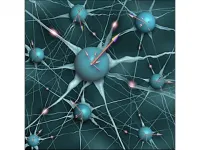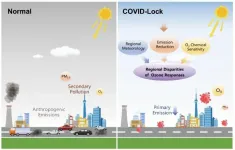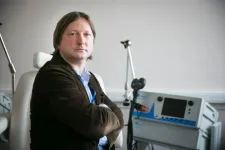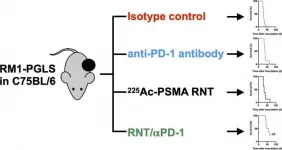Iodine oxoacids formed in oceans have major impact on climate
2021-02-08
(Press-News.org) Molecular iodine, a major emission from the ocean, can quickly convert to iodic oxoacids even under weak daylight conditions. These oxoacids lead rapidly to aerosol particles that significantly affect climate and human health.
Iodine-containing vapors that are emitted from oceans are a major source of aerosol particles. "Despite their importance to the climate, the formation of marine particles has been poorly understood," says Siddharth Iyer, Postdoctoral Researcher in Aerosol Physics Laboratory at Tampere University.
In this research, the formation of aerosol particles form from iodine-containing vapours under marine boundary layer conditions were studied. The experiments were carried out in the ultra-clean CLOUD chamber in CERN, where the nucleation and growth rates as well as the composition of freshly formed particles from iodic oxoacids (iodic acid and iodous acid) were measured.
These vapours derive from photolysis and oxidation of molecular iodine, for which the ocean surface is a major source. The conversion to iodine oxoacids were found to be extremely fast, even under weak daylight conditions. Although iodic acid was identified as the key vapour, a related species - iodous acid - was also found to play an important stabilizing role in the initial steps of neutral (uncharged) particle formation.
"Sulfuric acid is known to be key player in new particle formation, but our results indicate that iodine oxoacid particle formation can compete with sulfuric acid in pristine regions of the atmosphere. This significantly advances our understanding of aerosol formation," Iyer sums up.
INFORMATION:
The article Role of iodine oxoacids in atmospheric aerosol nucleation was published in Science.
[Attachments] See images for this press release:

ELSE PRESS RELEASES FROM THIS DATE:
2021-02-08
Cells, like humans, cast votes to make decisions as a group. But how do they know what to vote for? Researchers at the Francis Crick Institute and King's College London have uncovered how cells actively seek information in order to make faster and better collective decisions to coordinate the growth of new blood vessels. This provides a new basis for understanding intelligence in cells.
The process of how cells precisely and quickly coordinate action when they create new tissue is complex. They must collectively decide which cells should take on specific jobs and ensure that not too ...
2021-02-08
Is a quantum machine really more efficient than a conventional machine for performing calculations? Demonstrating this 'advantage' experimentally is particularly complex and a major research challenge around the world1. Scientists from the CNRS2, the University of Edinburgh (Scotland) and the QC Ware, Corp., (France and USA) have just proved that a quantum machine can perform a given verification task in seconds when the same exercise would take a time equivalent to the age of the universe for a conventional computer. For this demonstration, they combined a complex interactive algorithm that solves a certain type of mathematical problem with limited information and a simple experimental photonics ...
2021-02-08
Goal 7 of the Sustainable Development Goals (SDGs) aims to ensure access to affordable, reliable, sustainable and modern energy for all by 2030. Yet according to new research by Copenhagen Business School the poor planning and execution of decarbonisation strategies in emerging markets challenges the aims of Goal 7.
"In the effort to produce renewable energy and decarbonise their economies, emerging countries have neglected the effect on marginalised populations, which could ultimately prove unsustainable for all," says Assistant Professor Jacobo Ramirez from the ...
2021-02-08
An important class of challenging computational problems, with applications in graph theory, neural networks, artificial intelligence and error-correcting codes can be solved by multiplying light signals, according to researchers from the University of Cambridge and Skolkovo Institute of Science and Technology in Russia.
In a paper published in the journal Physical Review Letters, they propose a new type of computation that could revolutionise analogue computing by dramatically reducing the number of light signals needed while simplifying the search for the best mathematical solutions, allowing for ultra-fast optical computers.
Optical or ...
2021-02-08
A way of using machine learning to more accurately identify patients with a mix of psychotic and depressive symptoms has been developed by researchers at the University of Birmingham.
Patients with depression or psychosis rarely experience symptoms of purely one or the other illness. Historically, this has meant that mental health clinicians give a diagnosis of a 'primary' illness, but with secondary symptoms. Making an accurate diagnosis is a big challenge for clinicians and diagnoses often do not accurately reflect the complexity of individual experience or indeed neurobiology.
Clinicians diagnosing psychosis, for example, would frequently regard depression as a secondary illness, with implications for treatment decisions which focus more on ...
2021-02-08
The outbreak of COVID-19 raised a question about the relationship between anthropogenic emissions and air pollution, which has aroused heated discussion. Research on air-quality changes caused by the lockdowns in different areas shows similar substantial reductions in primary emissions. However, regional disparities exist in responses of secondary pollutants to emissions reduction, especially fine particulate matter and ozone (O3).
Professor Ding Aijun and his team from Nanjing University explored global air-quality changes during COVID-19 lockdowns and regional disparities in O3 responses to emission reductions. They integrated multiple observational datasets, including global air quality ...
2021-02-08
In a new study published in Journal of Extracellular Vesicles, Chen-Yu Zhang's group and Antonio Vidal-Puig's group at University of Cambridge report that pancreatic β cells secrete miR-29 family members (miR-29a, miR-29b and miR-29c) in response to high levels of free fatty acids (FFAs). These β cell-derived miR-29s are delivered to the liver, promoting insulin resistance and enhancing hepatic glucose output.
Over 100 years after insulin was discovered, it was believed that pancreatic β cells only secreted a single hormone--insulin. Pancreatic β cell-derived insulin regulates glucose homeostasis by binding with the insulin receptors located in the liver, skeletal ...
2021-02-08
The scientists of Tomsk Polytechnic University jointly with the colleagues from Keysight company have conducted an experiment with an electron beam at the TPU microtron to study a super-radiant regime that occurs when radiation is generated by a train of electron bunches. The research findings obtained by a high-precision measurement of a spectral line width proved that about 8,000 electron bunches in a super-radiant regime form monochromatic Cherenkov radiation. This experiment was conducted for the first time. The fundamental research findings are published in the Scientific Reports academic journal (IF: 4.120, Q1) and can be used for further research on the new sources of radiation in the terahertz range.
A super-radiant regime is a coherent ...
2021-02-08
Scientists at HSE University have learned that disagreeing with the opinion of other people leaves a 'trace' in brain activity, which allows the brain to later adjust its opinion in favour of the majority-held point of view. The article was published in Scientific Reports.
We often change our beliefs under the influence of others. This social behavior is called conformity and explains varios components of our behaviour, from voting at elections to fashion trends among teenagers.
Brain research has recently well informed about short-term effects of social influence on decision making. If our choice coincides with the point of view of the people who are important to us, this decision is reinforced in ...
2021-02-08
Reston, VA--A combination of radionuclide therapy and immunotherapy has proven successful in slowing the progression of prostate cancer and increasing survival time, according to new research published in the February issue of The Journal of Nuclear Medicine. The results of the murine study indicate that radionuclide therapy promotes prostate cancer immunogenicity, provoking a cellular response that makes the tumors more receptive to immunotherapy.
"Prostate cancer is generally viewed as an immunological cold cancer in which immunotherapies only have moderate success," said Katharina Lückerath, PhD, assistant professor of preclinical ...
LAST 30 PRESS RELEASES:
[Press-News.org] Iodine oxoacids formed in oceans have major impact on climate





